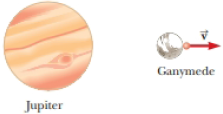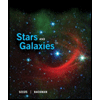
Concept explainers
Ganymede is the largest of Jupiter’s moons. Consider a rocket on the surface of Ganymede, at the point farthest from the planet (Fig. P13.23). Model the rocket as a particle. (a) Does the presence of Ganymede make Jupiter exert a larger, smaller, or same size force on the rocket compared with the force it would exert if Ganymede were not interposed? (b) Determine the escape speed for the rocket from the planet–satellite system. The radius of Ganymede is 2.64 × 106 m, and its mass is 1.495 × 1023 kg. The distance between Jupiter and Ganymede is 1.071 × 109 m, and the mass of Jupiter is 1.90 × 1027 kg. Ignore the motion of Jupiter and Ganymede as they revolve about their center of mass.
Figure P13.23

Trending nowThis is a popular solution!

Chapter 13 Solutions
PHYSICS:F/SCI.+ENGRS.(LL)-W/WEBASSIGN
Additional Science Textbook Solutions
General, Organic, and Biological Chemistry - 4th edition
Genetics: Analysis and Principles
Campbell Biology: Concepts & Connections (9th Edition)
Fundamentals of Physics Extended
Cosmic Perspective Fundamentals
- Based on the two periods (from hand timed and ultrasonic sensor), find the value of 'k' they suggest from the physics and from the value of the hanging mass. hand time period is 1.472s and ultrasonic sensor time period is 1.44sarrow_forwardNo chatgpt pls will upvotearrow_forwardExperimental Research Report Template Title: Paper Airplane Flight. Materials: Paper, ruler, tape Procedure: Fold paper into different airplane designs, such as dart, glider, or classic. Measure and record the distances each design flies when thrown with the same force. Discuss aerodynamics and the factors that affect flight distance. Introduction: (What do you expect to learn? What is the purpose of this lab? List any questions this experiment will answer.) Hypothesis: (Predict the outcome(s) of the experiment, must be in an “if…then format.) Materials: (What equipment and materials did you need for this experiment assignment? Describe how any equipment was connected. Also mention any special hardware or connections. List the name and amount of each item used.) Procedures: (What steps did you take to accomplish this lab assignment? Include Safety Precautions.) Data Collection: (Record the data that is required at each step of the…arrow_forward
- Title: Studying the Relationship Between Drop Height and Bouncing Height of a Ball: You can drop balls of different materials (e.g., rubber, plastic, ping pong) from various heights onto a flat surface and measure the height of their bounce using a ruler. Introduction: (What do you expect to learn? What is the purpose of this lab? List any questions this experiment will answer.) Hypothesis: (Predict the outcome(s) of the experiment, must be in an “if…then format.) Materials: (What equipment and materials did you need for this experiment assignment? Describe how any equipment was connected. Also mention any special hardware or connections. List the name and amount of each item used.) Procedures: (What steps did you take to accomplish this lab assignment? Include Safety Precautions.) Data Collection: (Record the data that is required at each step of the lab: tables, charts, graphs, sketches, etc.) Data Analysis: (Explain you…arrow_forwardA traveler at an airport takes an escalator up one floor as in the figure below. The moving staircase would itself carry him upward with vertical velocity component v between entry and exit points separated by height h. However, while the escalator is moving, the hurried traveler climbs the steps of the escalator at a rate of n steps/s. Assume that the height of each step is hs. (a) Determine the amount of chemical energy converted into mechanical energy by the traveler's leg muscles during his escalator ride given that his mass is m. (Use any variable or symbol stated above along with the following as necessary: g.) energy = (b) Determine the work the escalator motor does on this person. (Use any variable or symbol stated above along with the following as necessary: g.) work =arrow_forwardWhich of the following is part of the interior of the Sun? photosphere the corona sunspots radiation zonearrow_forward
- Most craters on the surface of the Moon are believed to be caused by which of the following? faults asteroids volcanoes meteoroidsarrow_forwardAn object is subjected to a friction force with magnitude 5.49 N, which acts against the object's velocity. What is the work (in J) needed to move the object at constant speed for the following routes? y (m) C B (5.00, 5.00) A x (m) © (a) the purple path O to A followed by a return purple path to O ] (b) the purple path O to C followed by a return blue path to O ] (c) the blue path O to C followed by a return blue path to O ] (d) Each of your three answers should be nonzero. What is the significance of this observation? ○ The force of friction is a conservative force. ○ The force of friction is a nonconservative force.arrow_forwardA block of mass m = 2.50 kg is pushed d = 2.30 m along a frictionless horizontal table by a constant applied force of magnitude F = 10.0 N directed at an angle 25.0° below the horizontal as shown in the figure below. m (a) Determine the work done by the applied force. ] (b) Determine the work done by the normal force exerted by the table. ] (c) Determine the work done by the force of gravity. ] (d) Determine the work done by the net force on the block. ]arrow_forward
- A man pushing a crate of mass m = 92.0 kg at a speed of v = 0.845 m/s encounters a rough horizontal surface of length = 0.65 m as in the figure below. If the coefficient of kinetic friction between the crate and rough surface is 0.357 and he exerts a constant horizontal force of 294 N on the crate. e (a) Find the magnitude and direction of the net force on the crate while it is on the rough surface. magnitude direction ---Select--- N (b) Find the net work done on the crate while it is on the rough surface. ] (c) Find the speed of the crate when it reaches the end of the rough surface. m/sarrow_forwardTwo blocks, A and B (with mass 45 kg and 120 kg, respectively), are connected by a string, as shown in the figure below. The pulley is frictionless and of negligible mass. The coefficient of kinetic friction between block A and the incline is μk = 0.26. Determine the change in the kinetic energy of block A as it moves from to, a distance of 15 m up the incline (and block B drops downward a distance of 15 m) if the system starts from rest. × J 37° Barrow_forwardYou are working for the Highway Department. In mountainous regions, highways sometimes include a runaway truck ramp, and you are asked to help with the design of such a ramp. A runaway truck ramp is often a lane of gravel adjacent to a long downhill section of roadway where trucks with failing brakes may need assistance to stop. Working with your supervisor, you develop a worst-case scenario: a truck with a mass of 6.00 × 104 kg enters a runaway truck lane traveling at 34.1 m/s. Assume that the maximum constant value for safe acceleration of the truck is -5.00 m/s². Any higher magnitude of acceleration increases the likelihood that semi-trailer rigs could jackknife. Your supervisor asks you to advise her on the required length (in m) of a runaway truck lane on a flat section of ground next to the roadway. marrow_forward
 Principles of Physics: A Calculus-Based TextPhysicsISBN:9781133104261Author:Raymond A. Serway, John W. JewettPublisher:Cengage Learning
Principles of Physics: A Calculus-Based TextPhysicsISBN:9781133104261Author:Raymond A. Serway, John W. JewettPublisher:Cengage Learning University Physics Volume 1PhysicsISBN:9781938168277Author:William Moebs, Samuel J. Ling, Jeff SannyPublisher:OpenStax - Rice University
University Physics Volume 1PhysicsISBN:9781938168277Author:William Moebs, Samuel J. Ling, Jeff SannyPublisher:OpenStax - Rice University Physics for Scientists and Engineers: Foundations...PhysicsISBN:9781133939146Author:Katz, Debora M.Publisher:Cengage Learning
Physics for Scientists and Engineers: Foundations...PhysicsISBN:9781133939146Author:Katz, Debora M.Publisher:Cengage Learning Stars and GalaxiesPhysicsISBN:9781305120785Author:Michael A. Seeds, Dana BackmanPublisher:Cengage Learning
Stars and GalaxiesPhysicsISBN:9781305120785Author:Michael A. Seeds, Dana BackmanPublisher:Cengage Learning Classical Dynamics of Particles and SystemsPhysicsISBN:9780534408961Author:Stephen T. Thornton, Jerry B. MarionPublisher:Cengage Learning
Classical Dynamics of Particles and SystemsPhysicsISBN:9780534408961Author:Stephen T. Thornton, Jerry B. MarionPublisher:Cengage Learning Foundations of Astronomy (MindTap Course List)PhysicsISBN:9781337399920Author:Michael A. Seeds, Dana BackmanPublisher:Cengage Learning
Foundations of Astronomy (MindTap Course List)PhysicsISBN:9781337399920Author:Michael A. Seeds, Dana BackmanPublisher:Cengage Learning





